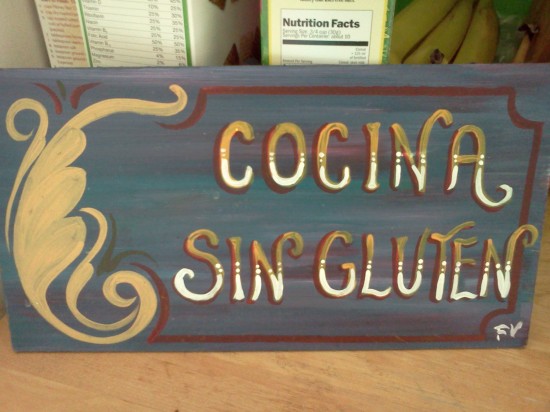Avoiding cross contamination is probably the most challenging part of being celiac. Gluten is hiding everywhere and as celiacs we need to be completely sure that the products we choose are 100% gluten free and safe for us. Buying safe gluten free food doesn’t put us in the safe zone yet, though. When preparing these foods we must ensure that our meal does not come into contact with any gluten. Breadcrumbs are a celiacs worse enemy!
Here are some of the things I do to avoid cross contamination. Please share your tips and ideas too. Since this topic is such a large and important one I decided to divide it into three sections. How to prevent cross contamination when cooking at home, eating out and travelling.
How to prevent cross contamination at home
- If possible make your kitchen 100% gluten free. In our home it’s just my husband and I and he eats gluten free at home with me. The only time he eats gluten is when he’s out of the house. No gluten gets into our kitchen to avoid any gluten getting into me! We even have our awesome ‘Cocina sin gluten’ sign in there (see the photo above), made for me by a woman at a street market in Buenos Aires.
- If you can’t make your kitchen completely gluten free, have your own gluten free space in the kitchen – a space when no gluten containing ingredients are allowed and where you can safely prepare meals without the threat of wheaty crumbs finding their way into your gluten free sandwich.
- Again if you don’t live in a completely gluten free environment, make sure you have your own contamination free pots and pans, utensils and cutting board. Not only will having your own cooking tools make cross contamination a lot less likely, it will also allow you to cook without having to scrub everything down every time.
- Read labels before buying anything. I will not buy anything I’m unsure of. 95% of what I eat is either naturally gluten free or made in a gluten free facility. If I’m unsure about an ingredient such as ‘flavour’, ‘colour, ‘spices’ etc I won’t buy it. If I’m worried that a product may have shared equipment with wheat I won’t buy it. If it’s made in the same factory as wheat and no gluten testing has been done I won’t buy it.
- Call and email the people who make the products you want to eat. If I’m not sure about a product and I really want to eat it I’ll email or call the manufacturer to check that it’s safe before I do. I’ve been caught out a couple of times in the past by products which are labelled as gluten free but then made on shared equipment with wheat. The risk is too high so I check, double check and triple check.
- If there are gluten eaters in your home make sure you have separate jars of things such as jam/jelly, peanut butter or mustard. You don’t want someone sticking a knife or spoon into a jar of something right after they have spread it on their whole wheat bread. This is exactly how cross contamination happens and something I’m always really wary about when visiting friends and family. I won’t eat anything from a jar unless it’s just been opened.
If you are a newly diagnosed celiac all of this probably sounds pretty intense and over the top. It’s not. We must be this careful. It’s the way it has to be when you have celiac disease.
How to avoid cross contamination when eating out and whilst travelling coming soon! What do you do to avoid cross contamination at home?





Laura West Kong
Aug 8th, 2012I’m working on improving my kitchen situation. I moved the toasters away from the cutlery drawers and marked or got rid of flours I can’t eat. I’m a cutting board fanatic. I have cutting boards designated for meats, veggies, non-gluten, and random glutenous foods. I need to get some fruit-only cutting boards though, cause I often smash garlic on the veggie ones, and garlic-scented fruit just doesn’t work for me.
I like your suggestion about the gluten-free space. Usually I’m just lucky to find an open space at all. Our kitchen is so crazy.
I’ve moved away from most processed foods, so at least I don’t have to worry about flavorings or other questionable additives. Everything I eat that has a label has only simple ingredients, such as coconut butter, almond butter, etc. I feel much better since doing this. Not sure if it’s because of avoiding CC, chemicals, just plain healthier food, or finally starting to heal.
Alaine @ My GF & DF Living
Aug 8th, 2012I couldn’t agree more with this list! I live with 7 other gluten eating roommates so separate jars, pots and pans are essential.